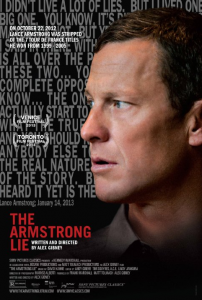
 This documentary could be retitled “The Gibney Apology.” In 2009, filmmaker Alex Gibney (2007 Oscar winner for “Taxi to the Dark Side”) set out to chronicle Lance Armstrong’s comeback. Of course, when the doping story finally broke wide, Gibney’s documentary was ruined. Or was it? “The Armstrong Lie” is an attempt to salvage that project, which, of course, goes in another direction.
This documentary could be retitled “The Gibney Apology.” In 2009, filmmaker Alex Gibney (2007 Oscar winner for “Taxi to the Dark Side”) set out to chronicle Lance Armstrong’s comeback. Of course, when the doping story finally broke wide, Gibney’s documentary was ruined. Or was it? “The Armstrong Lie” is an attempt to salvage that project, which, of course, goes in another direction.
It is obvious that Gibney was in quite a pickle when the film he thought he was making fell apart. His investors must have been devastated. One wonders what contract Gibney had with the super-secretive and protective Lance Armstrong, who is now notorious for crushing those who “ratted” on him. It is doubtful that Armstrong and his team of lawyers permitted complete unfettered access to the fallen star even before the revelations and confirmation following his “comeback.” But “The Armstrong Lie” does seem to capture some of the ugly side of the sportsman, while still giving him something of a soapbox to spin his position.
What is Armstrong’s defense? He argues at some point that he didn’t meet a definition of cheating, because, in doping, he was not doing anything other than what others were doing. The playing field was therefore level. Sure, Armstrong is slowly changing his tune, but it is a bit off-key.
Gibney tries in vain to get to the heart of the story. Probing questions get answered, but most viewers won’t be satisfied. And like the Oprah interview, the whole thing feels insincere and incomplete.
As a documentary filmmaker who greatly admires Gibney, I feel his pain. But as Gibney well knows some stories are discovered as they are reported and shot. What is somewhat troubling is that Gibney has devoted so much screen time to humanizing Armstrong. And this portion of the film is downright inspiring stuff!
But if Armstrong were a serial killer, for example, this would be the film that focuses on the murderer instead of the victims. In this time of mass shootings, we see a shift in news reporting away from the glorification of the monster. It is this glorification that the monster and others with such potential ultimately seek. Gosh, I have no idea what I would have done in Gibney’s position. After all, he had so much footage with Armstrong, and Armstrong had continued to grant him access as the Oprah interview took place and beyond.
Gibney’s decision is to focus on Armstrong, with little time devoted to his victims. Armstrong is both propped up and vilified in “The Armstrong Lie.” We do get that there is no true justification for Armstrong’s actions, but that message is watered down a bit. The unanswered question is whether doping matters when it may be a part of the sport. Unfortunately, Gibney can’t seem to turn that corner and give us a story that does little more than establish the positions and background.
Perhaps this film was made too soon. Armstrong has a long way to go before he comes clean. And the movie hints that such a thing may never happen. And when he finally does tell it all, will anyone care to listen?
